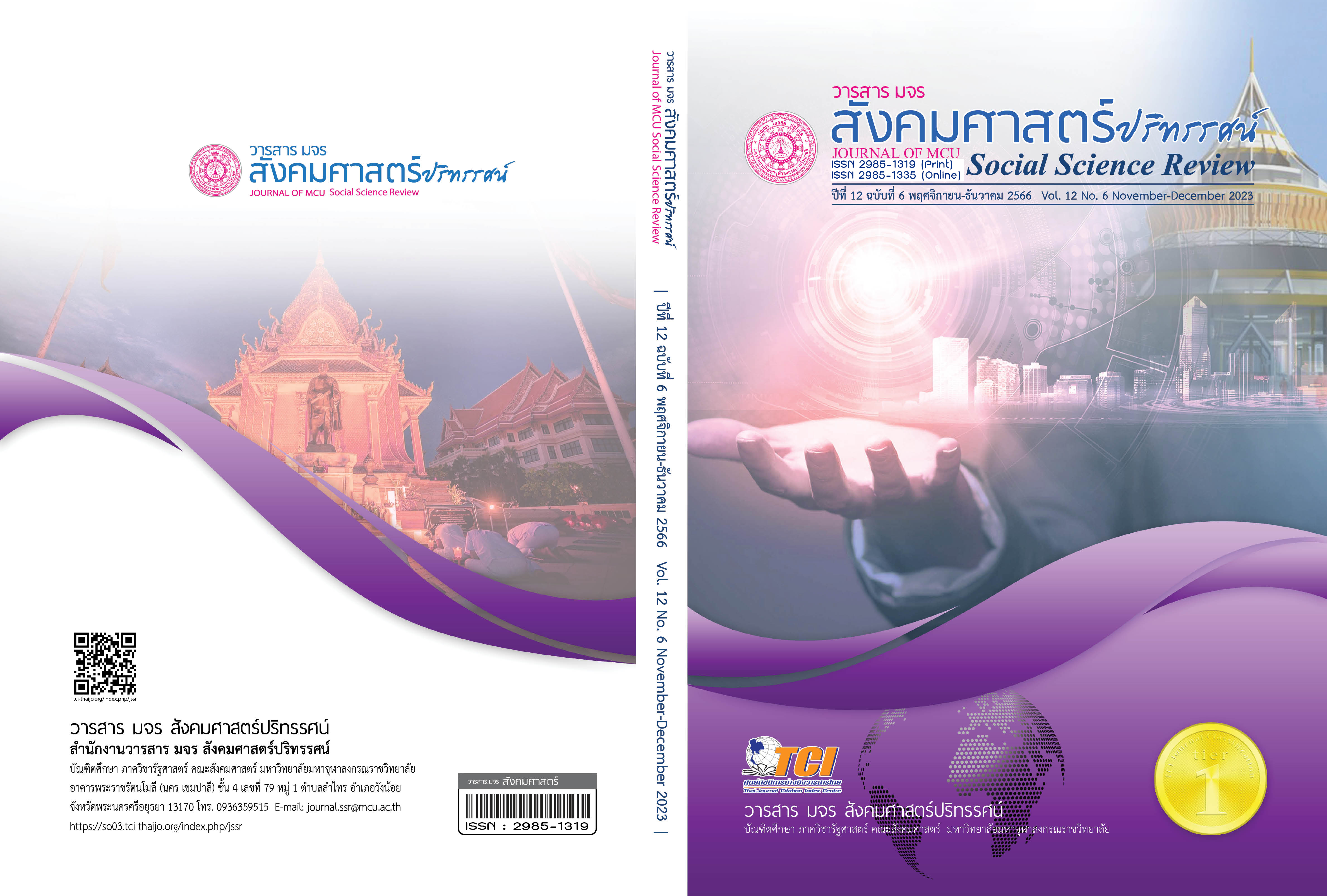การพัฒนาชุมชนปลอดยาเสพติดโดยหลักพุทธสันติวิธี: กรณีศึกษาบ้านป่ากล้วย ตำบลทุ่งพง อำเภอหนองฉาง จังหวัดอุทัยธานี
คำสำคัญ:
การพัฒนาชุมชน, ชุมชนปลอดยาเสพติด, หลักพุทธสันติวิธีบทคัดย่อ
บทความวิจัยนี้มีวัตถุประสงค์หลักคือ 1. เพื่อศึกษาบริบท สภาพปัญหา สาเหตุ อุปสรรค การแก้ไขปัญหายาเสพติด และหลักการ แนวคิด ทฤษฎีการพัฒนาชุมชนปลอดยาเสพติดตามวิทยาการสมัยใหม่ 2. เพื่อศึกษาหลักพุทธสันติวิธีที่เอื้อต่อการพัฒนาคนและการพัฒนาชุมชนปลอดยาเสพติด 3. เพื่อพัฒนาและนำเสนอกระบวนการพัฒนาชุมชนปลอดยาเสพติดโดยหลักพุทธสันติวิธี บ้านป่ากล้วย ตำบลทุ่งพง อำเภอหนองฉาง จังหวัดอุทัยธานี การศึกษาครั้งนี้เป็นการวิจัยเชิงคุณภาพ
ผลการวิจัยพบว่า 1. ในปี พ.ศ. 2561-2565 พบว่า ประชากรอายุ 15 ปีขึ้นไปในชุมชนบ้านป่ากล้วย ตรวจพบผู้เสพยาบ้า รวม 25 ราย สาเหตุจาก อยากมีเงิน ทรัพย์สิน หรือฐานะที่ร่ำรวย โดยอุปสรรคในการแก้ปัญหา ได้แก่ กลุ่มผู้ค้ายาเสพติดมีสื่อเทคโนโลยีที่ทันสมัย, ไม่ได้รับความร่วมมือจากชาวบ้าน และขาดการติดตามประเมินผลของเจ้าหน้าที่อย่างต่อเนื่อง
2. กระบวนการพัฒนาชุมชนปลอดยาเสพติด โดยใช้หลักบวร (บ้าน วัด โรงเรียน/ราชการ) โดยดำเนินการตั้งแต่ต้นน้ำ กลางน้ำ และปลายน้ำ ด้วยการขับเคลื่อนชุมชนโดยหลักพรหมวิหาร 4 ดังนี้ 1) เมตตา การค้นหาผู้เสพผู้ค้ายาเสพติด 100 % 2) กรุณา การอบรมบำบัดฟื้นฟูผู้ติดสารเสพติดซ้ำ ๆ 3) มุทิตา การยกย่องเชิดชู เมื่อผู้เสพยาเสพติดเข้ากระบวนการบำบัดแล้ว สามารถเปลี่ยนแปลงตนเองได้จริง 4) อุเบกขา การติดตามช่วยเหลือผู้เสพยาเสพติดไม่ให้กลับไปสู่วังวนของยาเสพติดอีก ซึ่งก่อให้เกิดเป็นพลังบวรที่เข้มแข็ง บุคคลอยู่เย็น ครอบครัวเป็นสุข ชุมชนยั่งยืน และสังคมสันติสุข
เอกสารอ้างอิง
นิรันดร์ จงวุฒิเวศย์. (2566). แผนปฏิบัติราชการรายปี พ.ศ. 2566 ของกรมการพัฒนาชุมชน. กรุงเทพฯ: กรมการพัฒนาชุมชน.
บฏสกรรัตน์ หงสกุล และคณะ. (2561). กระบวนการจัดการเพื่อคุ้มครองสิทธิและป้องกันการกระทำความรุนแรงต่อเด็กและสตรีในเขตกรุงเทพมหานครและปริมณฑล. วารสาร มจร สังคมศาสตร์ปริทรรศน์, 7(3), 193-205.
พระครูพินิตปริยัติกิจ (สมบัติ วรธมฺโม) และคณะ. (2561). รูปแบบการมีส่วนร่วมของพระสงฆ์ในการแก้ไขปัญหาการติดยาเสพติดในเขตปกครองคณะสงฆ์ภาค 2. วารสาร มจร สังคมศาสตร์ปริทรรศน์, 7(3), 1-14.
พระครูสิทธิวชิรโสภิต (ประสิทธิ์ สมฺมาปญฺโญ). (2565). การศึกษานโยบายของพรรคการเมืองในการหาเสียงเลือกตั้ง พ.ศ.2566 กับนโยบายเชิงพุทธที่ประชาชนไทยคาดหวัง. วารสาร มจร สังคมศาสตร์ปริทรรศน์, 12(3), 486-500.
พระครูโอภาสนนทกิตติ์ (ศักดา โอภาโส). (2565). ทางออกการป้องกันและการปราบปรามทุจริตในสังคมไทย. วารสาร มจร สังคมศาสตร์ปริทรรศน์, 12(1), 114-122.
พระพรหมคุณาภรณ์ (ป.อ. ปยุตฺโต). (2558). พจนานุกรมพุทธศาสตร ฉบับประมวลธรรม (พิมพ์ครั้งที่ 31). กรุงเทพฯ: สำนักพิมพ์เพ็ทแอนด์ โฮม จำกัด.
พิศมัย ทองเที่ยง. (2563). หลักการให้โอกาสผู้เสพผู้ติดยาเสพติดคืนคนดีสู่สังคมในสถานประกอบการด้วยพรหมวิหาร-สังคหวัตถุ 4. วารสาร Mahidol R2R e-Journal, 7(2), 11-29.
ภูฟ้าเรสท์โฮม. (2566). ปัญหายาเสพติดในไทย และแนวทางการแก้ไข ปี 2566. สืบค้น 24 ตุลาคม 2565, จาก https://www.phufaresthome.com/blog/drugs-problem-in-thailand-2566/
สำนักงานคณะกรรมการป้องกันและปราบปรามยาเสพติด. (2565). รายงานผลการดำเนินงานป้องกันและปราบปรามยาเสพติดประจำปี งบประมาณ พ.ศ. 2564. กรุงเทพฯ: กระทรวงยุติธรรม.
สำนักงานราชบัณฑิตยสภา. (2566). ยาเสพติด. สืบค้น 30 มกราคม 2566, จาก https://www.egacy.orst.go.th
ดาวน์โหลด
เผยแพร่แล้ว
รูปแบบการอ้างอิง
ฉบับ
ประเภทบทความ
สัญญาอนุญาต
ลิขสิทธิ์ (c) 2023 วารสาร มจร สังคมศาสตร์ปริทรรศน์

อนุญาตภายใต้เงื่อนไข Creative Commons Attribution-NonCommercial-NoDerivatives 4.0 International License.
เพื่อให้เป็นไปตามกฎหมายลิขสิทธิ์ ผู้นิพนธ์ทุกท่านต้องลงลายมือชื่อในแบบฟอร์มใบมอบลิขสิทธิ์บทความให้แก่วารสารฯ พร้อมกับบทความต้นฉบับที่ได้แก้ไขครั้งสุดท้าย นอกจากนี้ ผู้นิพนธ์ทุกท่านต้องยืนยันว่าบทความต้นฉบับที่ส่งมาตีพิมพ์นั้น ได้ส่งมาตีพิมพ์เฉพาะในวารสาร มจร สังคมศาสตร์ปริทรรศน์ เพียงแห่งเดียวเท่านั้น หากมีการใช้ภาพหรือตารางหรือเนื้อหาอื่นๆ ของผู้นิพนธ์อื่นที่ปรากฏในสิ่งตีพิมพ์อื่นมาแล้ว ผู้นิพนธ์ต้องขออนุญาตเจ้าของลิขสิทธิ์ก่อน พร้อมทั้งแสดงหนังสือที่ได้รับการยินยอมต่อบรรณาธิการ ก่อนที่บทความจะได้รับการตีพิมพ์ หากไม่เป็นไปตามข้อกำหนดเบื้องต้น ทางวารสารจะถอดบทความของท่านออกโดยไม่มีข้อยกเว้นใดๆ ทั้งสิ้น





